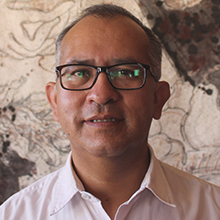ChagasLAMP (GHIT G2020-203)
Field validation of Trypanosoma cruzi-LAMP: a molecular point-of-care test for the control of congenital Chagas disease

- Duración
- 01/04/2021 - 31/03/2023
- Coordinador
- Julio Alonso
- Financiadores
- Global Health Innovative Fund (GHIT)
Chagas disease, caused by the protozoan parasite Trypanosoma cruzi, affects ~7 million people, mostly in Latin America. Vector-borne transmission is on the way of being controlled in several countries, but vertical transmission remains an uncontrolled major public-health challenge. Remarkably, available drugs have a very high cure rate in T. cruzi-infected newborns if administered early upon infection, thus a timely diagnose is crucial for treatment success.
However, the algorithm to detect congenital T. cruzi infection involves parasitological methods that lack sensitivity and a serological study must be performed several months later. In many endemic regions, people live far from referral centres which entails that a large proportion of infants rarely go back for diagnosis confirmation and treatment, if infected. Consequently, they evolve to the chronic phase of the disease with the risk of developing severe manifestations.
Molecular-based diagnostics have a very high sensitivity to detect congenital T. cruzi infections, but laboratories in those distant regions are not equipped to perform them. With the aim to provide a suitable point-of-care (POC) test for the timely diagnosis of congenital Chagas disease in these settings, we will validate the implementation of EIKEN T. cruzi loop-mediated isothermal amplification (LAMP) prototype in the field.
Total Funding
¥ 147,127,368
Nuestro equipo
Coordinator
-
 Julio Alonso Padilla Assistant Research Professor, Director of the Chagas Initiative
Julio Alonso Padilla Assistant Research Professor, Director of the Chagas Initiative
ISGlobal Team
-
Aina Casellas Torrentó
-
Laura Ferradino Research Assistant
-
 Quim Gascon Research Professor
Quim Gascon Research Professor -
 Susana Méndez Data manager
Susana Méndez Data manager -
 Mirko Rojas Consultor y coordinador de campo en Bolivia
Mirko Rojas Consultor y coordinador de campo en Bolivia -
SERGI SANZ Responsable de Departamento - Estadística
Otros proyectos
Ver proyectos pasadosNHEPACHA
Nuevas Herramientas para el Diagnóstico y la Evaluación del Paciente con Enfermedad de Chagas
Estudio inmunológico de la vacuna RTS,S
Estudio de correlatos de protección frente a la malaria después de la vacunación con RTS,S/AS01E: Una evaluación inmunológica exhaustiva en el ensayo clínico de Fase III, doble ciego, aleatorizado, multicéntrico con un grupo control
Euroleish.net
Control of Leishmaniasis. From bench to bedside and community
GREPIMER
Grup de recerca en patología importada i malaties emergents i re-emergents
TESEO
Nuevos regímenes de quimioterapia y biomarcadores para la enfermedad de Chagas
ASINTMAL
Unravelling Disease Tolerance and Host Resistance in Afebrile 'P. falciparum' Infections: a Prospective Study in Mozambican Adults
ADAM
Administración masiva y focal de fármacos antimaláricos para avanzar hacia la eliminación de la malaria en Mozambique: acelerando la implementación de programas y políticas
Science4Pandemics
Citizens engagement digital platform for collective intelligence in pandemics
HIDDENVIVAX
Novel organ-on-a-chip technology to study extracellular vesicles-mediated cryptic infections in Plasmodium vivax malaria
Subclinical Infections in Children and Long Term Health Effects
Infection acquisition in early life and health outcomes in childhood - MARATO TV3
Herramienta innovadora de detección de enfermedades y vacunación a población inmigrante en riesgo en España
Project Code: PI21/00651
Impacto de las coinfecciones en el balance de respuestas de anticuerpos y linfocitos T helper a antígenos diana de inmunidad natural y vacunal frente a patógenos humanos prominentes
Project Code: PI20/00866
EpiGen
Building Scalable Pathogen Genomic Epidemiology in Ethiopia
MalTransc
Transcriptional regulation of adaptation and developmental decisions in malaria parasites: from epigenetic variation to directed transcriptional responses
BOHEMIA
Broad One Health Endectocide-based Malaria Intervention in Africa
RESPONSE
Mechanisms of the transcriptional responses to changes in the environment in the malaria parasite Plasmodium falciparum
VivaxEVTalk
Extracellular Vesicles as Intercellular Communicators and Biomarkers of Cryptic Erythrocytic Infections in Plasmodium vivax malaria
VaMonoS
Unravelling the heterogoneity and function of monocytes in vaccination and immunity to malaria
CLIMSOCTRYPBOL
Insight on climate and social participatory research for integral management of vectorborne zoonosis caused by Trypanosoma cruzi and Leishmania spp. in the Bolivian Gran Chaco.
SexMal
Social affairs and sex in P. falciparum: implications for malaria elimination
MENA Migrant Health
Transforming data collection and surveillance to drive migrant health research, care and policy
MESA
La Alianza Científica para la Erradicación de la Malaria (MESA) tiene como objetivo avanzar en la ciencia de la erradicación de la malaria.
SMART
Identifying Severe Malaria with a new Aptamer-based Rapid diagnostic Test
GlycoTargets
Nuevas terapias antimaláricas dirigidas contra las vías de glicosilación de 'Plasmodium falciparum'
GenMoz
P. falciparum genomic intelligence in Mozambique





